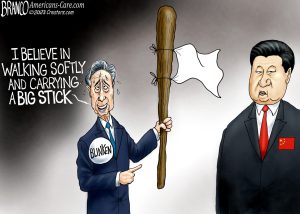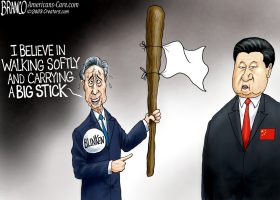Antony Blinken is the first US secretary of state to visit China in five years. His visit was aimed at thawing the relationship between the two countries amid rising tensions over industry and Taiwan.
However, in trying to placate the Chinese, he super-charged tensions between China and Taiwan.
BREAKING: Secretary of State Anthony Blinken gives China the green light to invade Taiwan during his visit to Beijing, China.
— Collin Rugg (@CollinRugg) June 19, 2023
“We do not support Taiwan independence.”
What a pivot from Biden’s previous comments from just months ago. What happened?
“Yes, if in fact, there was… pic.twitter.com/gyAp8TPxrW
Blinken is the highest-level American official to visit China since President Joe Biden took office and the first secretary of state to make the trip in five years. He was originally due to visit China in February, but the trip was postponed after the US shot down an alleged Chinese spy balloon flying over the United States.
Meanwhile, tensions have continued to rise in the Taiwan Strait while the US and China have also stepped up their rivalry in the global semiconductor industry.
So to help matters along, Blinken told China the US still supported the “One China policy”. “We do not support Taiwan independence” he said when he met with People’s Republic of China State Councilor and Foreign Minister Qin Gang in Beijing. This meeting was handled with disrespect from the getgo by the Chinese who snubbed the US by greeting Blinken and his group at the door to a villa on the grounds of Beijing’s Diaoyutai State Guest House, rather than inside the building as is customary.

“The US needs to give up the illusion of dealing with China ‘from a position of strength,'” said Chinese Foreign Ministry spokesperson Wang Wenbin ahead of the visit. “China and the US must develop relations on the basis of mutual respect and equality, respect their difference in history, culture, social system and development path.”
Qin told Blinken that relations between the United States and China “are at the lowest point since the establishment of diplomatic relations,” according to state-run broadcaster CCTV.
On Monday he met on Monday with Chinese President Xi Jinping and said they agreed to “stabilize” badly deteriorated U.S.-China ties, but America’s top diplomat left Beijing with his biggest ask rebuffed: better communications between their militaries.
From his meeting with Xi, Blinken discovered that China is not ready to resume military-to-military contacts, something the U.S. considers crucial to avoid miscalculation and conflict, particularly over Taiwan.
While both sides expressed a willingness to hold more talks, there was little indication that either is prepared to bend from positions on issues including trade, human rights conditions in China and Hong Kong, Chinese military assertiveness in the South China Sea, and Russia’s war in Ukraine where China is Putin’s ally.

